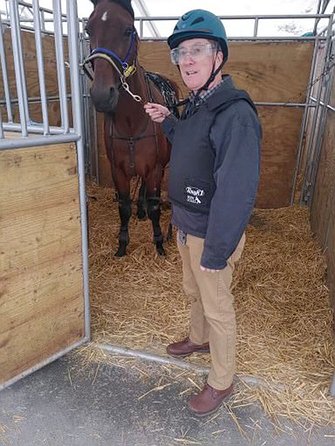As a new member of the General Assembly’s important Agriculture Committee, I want to take this opportunity to share some interesting agricultural-related information about our wonderful Commonwealth. This week, let us look at Virginia’s enduring love affair with horses, which dates back to 1610 with the arrival of the first equines in Jamestown and continues to shape the state’s landscape and economy even today. I bet you didn’t realize that Virginia stands proudly as the fifth-largest equine state in the nation, boasting a vibrant industry encompassing live racing, horse farms, breeders, and enthusiasts. From the thundering hooves of thoroughbred racehorses to the graceful leaps of steeplechase jumpers, Virginia truly is a haven for horse lovers. Here in Fairfax County, we have Frying Pan's Equestrian Center. It is a public-use facility that is part of Frying Pan Farm Park. The center offers rental events, schooling, horse shows, short-term stabling, and multiple trailer-in schooling options.
The equine industry in Virginia is an economic powerhouse, supporting over 170,000 horses and generating significant revenue. Virginia’s Equine Alliance notes that horse owners across the Commonwealth invest an average of $2,969 per horse annually, totaling approximately $505 million in direct expenditures. Moreover, horse-related events attract over 800,000 participants and spectators each year and infuse more than $167 million into the state's economy through over 700 events and competitions. Cash receipts from horse sales reach an impressive $99.4 million annually, solidifying equine-based activities as the seventh largest agricultural commodity in Virginia. Furthermore, the industry sustains nearly 20,000 jobs and contributes over $352 million in wages and salaries annually.
Virginia's equine population reflects a diverse array of breeds, with Thoroughbreds and Quarter Horses leading the pack at 36,300 and 32,500 heads, respectively. Across the state, the equine inventory by breed is distributed as follows:
- Thoroughbreds: 21.4%
- Quarter Horses: 19.1%
- Arabians: 7.1%
- Ponies: 6.2%
- Tennessee Walkers: 5.7%
- All other equine: 40.5%
The equine industry in Virginia encompasses agriculture, breeding, racing, and entertainment, blending rural traditions with urban pursuits. With over 12,800 horses sold annually, equine sales contribute nearly $99.4 million to the state's economy. Breeding, another cornerstone of the industry, sees an annual expenditure of approximately $505 million, with top breeds including Thoroughbreds, Quarter Horses, Arabians, Ponies, and Tennessee Walkers.
Virginia is home to approximately 28,000 equine operations/farms, with Loudoun, Fauquier, Albemarle, Augusta, and Bedford counties boasting the highest horse populations. We still have a few in Fairfax County too and they are a terrific place for children to learn first-hand about horses and even how to ride one.
Horse racing, a time-honored tradition in Virginia, has evolved into a significant economic driver. Pari-mutuel wagering, dating back to colonial times, has generated substantial tax revenue for the Commonwealth. Since its inception in 1996, horse racing has contributed well over $23 million in tax revenues. Pari-mutuel wagering has directly benefited various cities, counties, and special interest groups, totaling $31 million in contributions since 1997. This year during the General Assembly session we passed legislation that requires 0.025% of funds from wagers on historical horse racing machines be distributed to the Virginia-Maryland Regional College of Veterinary Medicine, the Virginia Horse Industry Board, the Virginia Horse Center, and the Problem Gambling Treatment and Support Fund, among others.
Virginia's equine industry stands as a testament to the enduring bond between humans and horses, enriching the Commonwealth's culture, economy, and heritage for generations to come.
